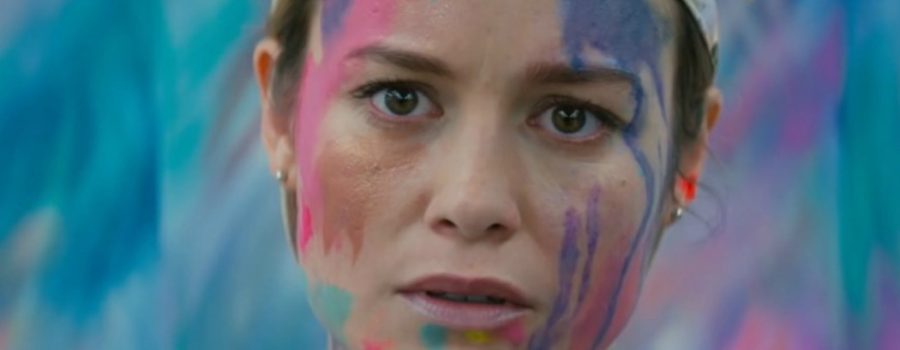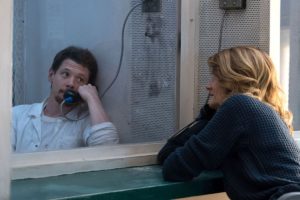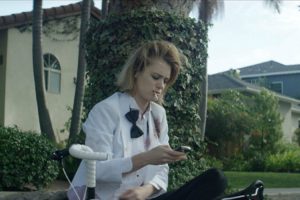[Published at Film Inquiry] A Sacramento, California native, at the age of six, Brie Larson became the youngest person to attend the American Conservatory Theater (A.C.T.) in San Francisco in the organization’s 54-year history. An accomplished activist, writer, actor, singer, producer, and director, the Oscar winner has already established herself as the modern Renaissance Woman, and role model to emulate, during her (in comparison to the select few of the more than 200,000 actors, directors, producers, musicians, and singers employed in the entertainment business in the United States who’ve achieved a fraction of what she has over the course of a considerably longer period of time) nascent career.
With the release of the critically and financially exceptional Captain Marvel on March 8, her highly anticipated, integral role in Avengers: Endgame later this month, and her impressive directorial debut, Unicorn Store, recently premiering on Netflix on April 5, 2019 is already the year of Brie Larson. We may just be entering the decade of Brie Larson. And that future in the film industry looks unapologetically bright…and glittery.
Unicorn Store tells the tall tale of Kit (Larson), a twenty-something perpetually suspended in the mystical, blind sanguinity of her childhood. After she is kicked out of art school, the magic of her childhood she so desperately desires to grip onto begins to slip through her fingers when she must move back into her parents’ house and childhood home to take a monotonous temp office job. Societal conformity and a willfully naive adherence to a mindless, corrupt corporate entity’s set of rules and routines begin to suck her childlike curiosity out of her and force her to “grow up.” That notion of “growing up” is an antiquated form of thinking, though. Do we ever have to give up our childhood dreams or interests? Sure, we can’t remain dependent on our parents forever, and must become independent in our adulthood. But what is so wrong about holding onto a piece of your childhood? Enter the ever-mysterious, always charming The Salesman (Samuel L. Jackson).
Utilizing an engaging script by first-time narrative feature screenwriter Samantha McIntyre, Larson expertly commands a singular visual palette, interweaves beautifully universal themes, and excavates strong performances from the cast (including another excellent performance from herself) at the helm of Unicorn Store, all while juggling her director, actor, and producer hats.
The Salesman & The Unicorn
Unicorn Store premiered at the Toronto International Film Festival on September 11, 2017. At the time, Larson and Jackson had only starred in one film together: Kong: Skull Island. However, the two actors were set to begin principal photography the following March on Captain Marvel, which would become the first female superhero film to cross $1 billion at the worldwide box office (one of its many accolades and glass ceiling-shattering firsts). One of the many wonderful things to come out of Captain Marvel, described as an ode to ’80s and ’90s buddy cop films, was the onscreen chemistry between Larson and Jackson. That budding chemistry shines in Unicorn Store. As The Salesman, Jackson is eccentric, unfailingly positive, elusive, hilarious, and convincingly omniscient. He is the ideal compliment to Kit’s fanciful naiveté.

The Salesman sells unicorns at the evanescent The Store. A nondescript hole in the wall in an abandoned building, The Store contains everything Kit has ever wanted: a unicorn…Well, sort of. After The Salesman offers to sell Kit a unicorn, a gesture that takes less convincing than would the average, more cynical person, he tasks her with a series of tests, of sorts, to prove that she is ready, in body and mind, to take care of a unicorn. Although some viewers may fixate on whether or not the offer is real, whether or not unicorns exist in Larson‘s cinematic world, throughout the film, that isn’t necessarily the point.
The Unicorn represents the unconditional love, comfort, warmth, security, hope, dreams, and simplicity of one’s childhood. A fleeting feeling that we are often left chasing, trying to recapture, as we grow older and become more aware of the asperities of the world. The Unicorn is available only to those who need it the most. Those who could use a harkening back to the purity and innocence of childhood during a particularly difficult period of their adulthood.
A Fleeting Reality In An Upsetting World
The world in which we create and immerse ourselves in during our childhoods are our realities at that time. It is all we know. From this perspective, childhood is a mentality. It can be something that we revert to in our minds in order to find comfort in when things become difficult. Kit holds onto her childhood reality stronger, lingers in this mentality longer, than most adults her age. The majority of the people around her think it’s a transitional phase, but it’s simply Kit being Kit.

Joan Cusack and Bradley Whitford are ideally cast as Kit’s loving, supportive, and unabashedly upbeat parents, Gladys and Gene, co-owners of a therapeutic outdoor retreat for victims of trauma. Although they tolerate her tendency toward excessive glitter, her heart-to-hearts with her Care Bears, and the sudden rebuilding of her childhood playhouse (a stable as one of her tasks given by The Salesman for her future unicorn), they also encourage her to get a job. She takes the first temp job she can get to prove that she is ready for adulthood, headfirst into the world of PR.
As we all have done, she learns as she goes on the job, watching and emulating her fellow employees, trying her best to fit into the corporate culture. Archaic or toxic corporate culture can inherently drain the creativity and autonomy out of an individual. Adherence to the dull corporate culture is something of which the vice president, Gary (Hamish Linklater), apparently seems to have grown tried. Upon initially meeting Kit, he appears to take interest in her fresh ideas, promising her full-time employment. After a series of creepy encounters, however, including an extended smelling of Kit’s hair, confusing conversations that blend professional talk with uncomfortable personal advances, and hints from other women employees, it becomes clear to Kit that she is being sexually harassed in the workplace.
Seeking A Friend For A Quarter-Life Crisis
Kit is in a state of crisis in that some of her notions of the world, stemming from childhood, are collapsing upon themselves, and others are proving to be awe-inspiringly true. After being kicked out of art school and mistreated in the workplace, her notion that one can pursue and accomplish their dreams, as long as they put their mind to it, is challenged. However, her most, seemingly, far-fetched childhood dream of having a pet unicorn appears to be within her reach. Having a stranger contact you about a unicorn for sale…with an exceedingly convincing sales pitch…is enough to send anyone’s preconceived notions of reality into a tailspin.

One of the standout performances in Unicorn Store belongs to Mamoudou Athie (of Patti Cake$, The Get Down, and The Front Runner fame), who plays amateur carpenter Virgil. Kit enlists Virgil’s help in building her stable. She convinces him it’s for a pony, but he soon learns the complexity of her situation. The only person willing to fully suspend disbelief and embark upon this seemingly dubious quest with Kit, Virgil becomes a meaningful friend, opening the door, potentially, for something more in their relationship.
Athie plays Virgil with a stumbling, stoic confidence and a reserved sense of humor, nailing his comedic timing. With the help of this friendship, along with many other support factors, Kit gains her confidence back, eventually exacting revenge on her boss in a most satisfying way, truest to the character’s inherent nature.
Conclusion: Let’s Hear It For Unicorn Store
Ultimately, whether or not Kit ever obtains The Unicorn in Unicorn Store, she realizes that she already has everything that it represents: unconditional love from her family, comfort, warmth, and security in her home, the understanding that hope and simplicity are mentalities which can be applied to everyday life, and the recognition that dreams are never truly broken or gone. After all, “the most adult thing you can do is failing in what you really care about,” explains Gladys to Kit, in Cusack‘s most emotional scene. It’s what we do with that failure that defines us. It never means that the dream is over.
Adding to Unicorn Store‘s whimsical tone are the playful, imaginative score by Alex Greenwald (Donnie Darko, frontman of the band Phantom Planet) and the ethereal, ephemeral beauty of the cinematography of Larson‘s frequent collaborator, Brett Pawlak (Short Term 12, The Glass Castle). Supported by a superior crew, backboned by McIntyre‘s script and spearheaded by Larson‘s fervid direction, a laudable cast, led by Larson and Jackson, and a seamless blend of comedy and drama, Larson‘s directorial debut marks the beginning of a new chapter in the multi-hyphenate’s career.
What is your favorite theme in Unicorn Store? How did you react to the ending? Are you excited about Brie Larson’s promising directorial future?
Unicorn Store was released exclusively on Netflix worldwide on April 5, 2019. It is currently available to stream. For more information on its release, click here.
Opinions expressed in our articles are those of the authors and not of the Film Inquiry magazine.








Leave a Reply
Your email is safe with us.